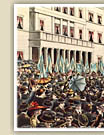
The general crisis was the result of serious problems in the economy and society, due to the failure of national policy and the irresponsibility of the traditional political world and the monarchy.
The Cretan declaration regarding Union with Greece in 1908, its continuing acceptance of Turkish sovereignty, its concern to avoid, at all costs, involvement in a Greco-Turkish
war and its wish to support the intervention of the Great Powers, was one more severe blow to the prestige
of the King and his entourage, as concerned their capacity in managing national issues.
A sense of humiliation and inferiority prevailed especially among Greek army officers. This originated in the 1897 defeat and was perpetuated by the
'irreproachable' (as it was ironically called) attitude of Greece in her relations with Turkey, especially
in relation to the declaration of the Union of Crete with Greece. At the same time,
there was a general discontent against the political world, which was held to blame for
insufficient army equipment and the overall bad state of the army.
To this climate of unease were added complaints about favouritism and also
some German-inspired regulations hindering promotions and threatening to bring stagnation to the careers of many officers. Both these issues were reported
to Prince Constantine, the commander-in-chief of the army.
Additionally, the economic crisis of 1908, the result of failure to dispose of
agricultural products abroad, and the international depression that had decreased
the remittances of Greeks from Egypt and the USA, had hit the income
of officers, who, as other professsional social groups, were being supported (in addition to their salaries) by family, chiefly agricultural, resources.
|
 |

To the turmoil prevailing in the army, the effect that the Young Turk revolution,
the Committee of Union and Progress (CUP), had on the Greek officers must also be taken into account,
in that it reinforced the existing feeling of inferiority, juxtaposing the revival effort of the Turks
with the stagnancy of Grece. Thus, several lower ranking officers founded a secret society, the Military League. Its members increased and it was finally headed by
Colonel Nikolaos Zorbas.
The military coup or 'pronunciamento' of Goudi took place on 15
August 1909. Initially declaring professional claims, such as the reconstruction of the army and the improvement of the fighting readiness of the country in general,
the officers eventually put forward wider reform demands concerning the radical purging
of the state administration. The government of Dimitrios Rallis, failing to manage the situation,
resigned and the King appointed Kyriakos Mavromichalis to form a new government,
which gave way to several of the League's demands.
The officers were practically in control both of Parliament and the executive
authority. The officers' actions was warmly received by the populace, as can be shown in the huge demonstration in Athens at the end of September.
The following period, until the end of 1909, has also been characterized as a period of uncertainty
and clashes. Despite the initial success of officers and the promotion of several
of their reform claims by voting relevant enactments, these had to confront the reaction of the old political world. Besides,
the League did not have a clear political and ideological character, its
intervention was more related to the manifestation of a discontent towards the old parties
and the palace. The situation was leading to an impasse and the League inclined to finding a political councillor, which it recognized in the person of the Cretan statesman,
Eleftherios Venizelos.
The military coup of Goudi has for long preoccupied historians and researchers. It has been interpreted
as a reaction of the army to being an autonomous political factor - not a paradox if we
take into account the social structures of Greece at the time - and as an example of 'incompetent'
leadership being replaced by a 'more competent' one, without
aiming, however, at any institutional overthrow. It has also been termed a bourgeois revolution (which in the Greece of 1909 does not match the economic and
social character of the country), as a clash between the bourgeoisie and the rising
entrepreneurial class, who were trying to supplant the former. It remains incontestable though, that the coup
was supported mostly by the lower social strata, the petit bourgeoisie, workers and would-be
immigrants who found themselves in Athens, under-employed or unemployed and looking forward
to their departure. These constituted the great crowds of the September demonstration, people who turned against the upper social strata, the bourgeoisie included. Very soon, however,
the radicality of the lower strata was extinguished due to lack of any vitality
and ideological maturity, and Eleftherios Venizelos promoted an urban modernization
that represented the pursuits of the ascending middle class.
At all events, the military coup of Goudi paved the way for the modernization of the
economy and the consolidation of the status of the bourgeoisie. It was, undoubtedly, a turning point in Greek history.
|
 |
